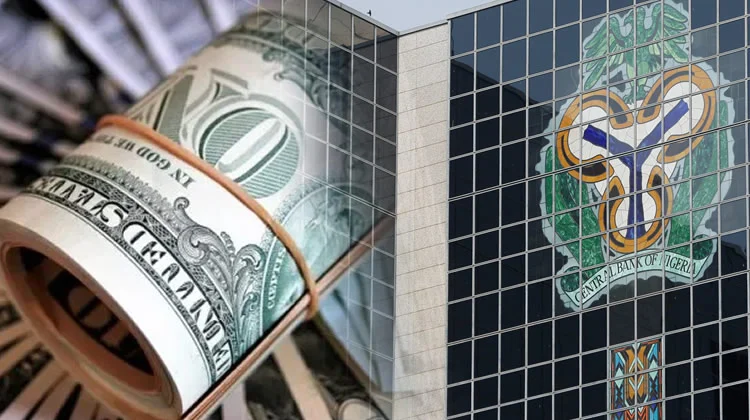Nigeria’s external reserves fall by $1.8bn in 10 weeks – Report

Dollar/CBN
Nigeria’s foreign exchange reserves have fallen by $1.8bn in 10 weeks, according to data from the Central Bank of Nigeria.
As of May 29, 2024, the country’s FX reserves stood at $32.69bn, down from $34.44bn as of March 18.
This decline signifies a drop from the $36.1bn recorded in May 2023.
The reserves have been declining steadily over the past few months, with a total decrease of $3.4bn since February 2024.
Experts believe that the decline in FX reserves is attributed to a combination of factors, including debt repayment, a significant decline in oil exports, a decrease in foreign investment, and a rise in imports.
Debt repayment recorded by the apex bank as of January 2024 was $560m, it reduced to $283.29m in February and then $276.16m in March 2024. Experts claim that the apex bank must have been servicing the foreign debts from the external reserves.
In the month of May, the naira ended the month weaker, despite a surge in dollar supply amounting to $4.60 billion in the official foreign exchange market.
The FX market closed for the month on Friday with the naira losing 5.60per cent as the dollar was quoted at N1,485.99, weaker than N1,402.67 quoted at the beginning of the month, according to data from the FMDQ Securities Exchange Limited.
The foreign exchange market closed for May 2024, with the dollar selling for N1,470, weaker weaker than N1,380 quoted at the beginning of the month.
The currency’s performance this week reflects a significant struggle to maintain its value amidst fluctuating forex turnover and investor sentiment.
The CBN Governor, Olayemi Cardoso, according to The Punch gave the specific reasons for the significant decline in the reserves.
He explained, “What we have seen concerning shift in our reserves is the shift that you would find in any country where for example, debts are due and certain payments need to be made and they’re done because that is also part of keeping your credibility intact and other times money comes in and you know it takes the reserves up again and watches in the next couple of days, there will be an improvement.
Nigeria’s economy is heavily reliant on oil exports, which account for over 90 per cent of its foreign exchange earnings.
Financial experts noted that the decline in FX reserves had led to a weakening of the naira, Nigeria’s currency, which has been struggling against the US dollar.
The naira has lost over 100 per cent of its value against the dollar since the beginning of 2024, making it one of the worst-performing currencies in Africa.
“The CBN has been intervening in the foreign exchange market to stabilise the naira and boost investor confidence.
“However, the decline in FX reserves has raised concerns about the country’s ability to meet its foreign debt obligations and finance its imports.
Nigeria’s FX reserves are a critical indicator of the country’s economic health, and the decline has sparked concerns among economic experts. The government has been under pressure to diversify the economy and reduce its reliance on oil exports.
“The decline in FX reserves is a clear indication that Nigeria’s economic challenges are far from over,” he added.
He urged that “the government must take urgent steps to address the decline in oil exports, boost foreign investment, and diversify the economy to prevent further decline in the country’s FX reserves.
Meanwhile, the naira began trading activity at the official market on a positive note, appreciating to N1,476 per dollar on Monday.
The currency increase in value was 0.61 per cent from N1,485.99 recorded on Friday.
The daily market summary released by the FMDQ showed that the intraday high closed at N1,500 from N1,550 per dollar recorded on Friday. The intraday low closed weaker at N1,250/$1 from N1,174.88/$1 quoted at NAFEM on Friday.
The dollar supplied by willing buyers and willing sellers was $121.87m.











